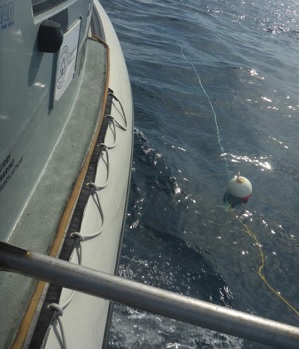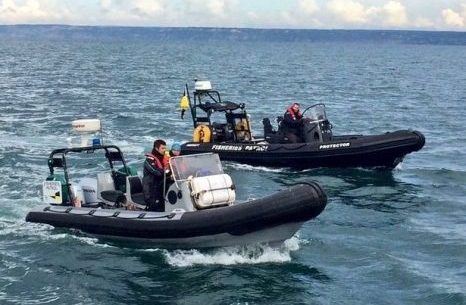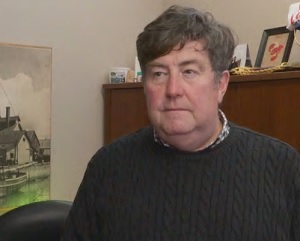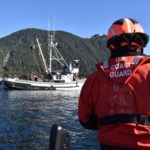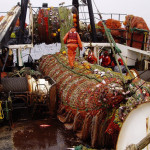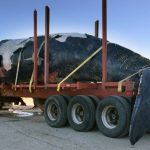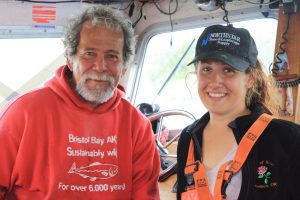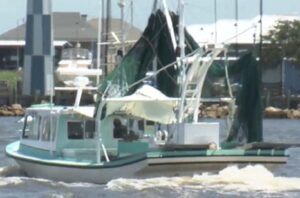Tag Archives: Law Enforcement
What happened to the 3,000 pounds of haddock seized in a fish-plant bust?
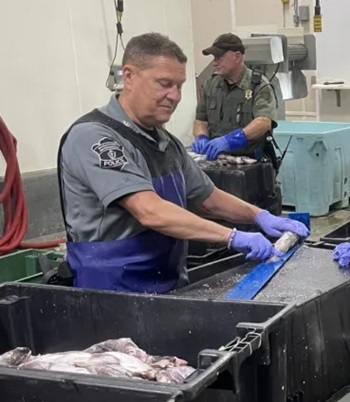 Acting Colonel Patrick Moran of the Massachusetts Environmental Police had a problem: 3,000 pounds of confiscated haddock on the New Bedford waterfront. The law against undersized catch had been enforced, but now what? Out of a total load of 11,000 pounds that came off the boat, the seized fish had come up short of the required 16-inch length, Moran said at the time. Seized on Thursday, June 20, as Moran was making rounds of local fish processing houses, there it sat in a plant that the MEP declined to name. He knew Shelley Edmundson, a founding member and executive director of the Martha’s Vineyard Fishermen’s Preservation Trust, a nonprofit devoted to sustaining the island’s fishing culture. He made a call. His timing could have been better, and it could have been worse. But, this big load of haddock would be complicated, she said. more, >>CLICK TO READ<< 15:54
Acting Colonel Patrick Moran of the Massachusetts Environmental Police had a problem: 3,000 pounds of confiscated haddock on the New Bedford waterfront. The law against undersized catch had been enforced, but now what? Out of a total load of 11,000 pounds that came off the boat, the seized fish had come up short of the required 16-inch length, Moran said at the time. Seized on Thursday, June 20, as Moran was making rounds of local fish processing houses, there it sat in a plant that the MEP declined to name. He knew Shelley Edmundson, a founding member and executive director of the Martha’s Vineyard Fishermen’s Preservation Trust, a nonprofit devoted to sustaining the island’s fishing culture. He made a call. His timing could have been better, and it could have been worse. But, this big load of haddock would be complicated, she said. more, >>CLICK TO READ<< 15:54
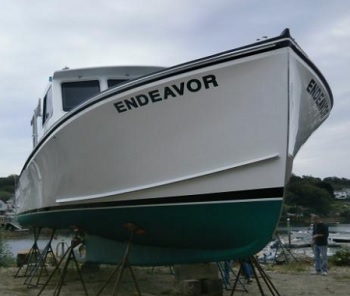
Endeavor to join DMR’s patrol fleet
Endeavor made its first trip on Tuesday, July 13 on its way to becoming the newest addition to the fleet of the Department of Marine Resources in Boothbay Harbor. Near completion by Farrin’s Boat Shop in Walpole, the patrol boat was carried to its launch site at Gamage Shipyard in South Bristol. “We are waiting for a replacement computer for the engine,” said Bruce Farrin Jr. >click to read< 08:52
Unusual policy allows Massachusetts Environmental Police to interrupt shifts to work private details
 For a decade, the Massachusetts Environmental Police have operated under an unusual paid-detail policy that national law-enforcement experts warn could jeopardize officers’ commitment to public safety. The practice, known as splitting shifts, allows Environmental Police officers to interrupt their regularly scheduled duties to work a paid detail, provided that they return to work afterward and complete their required hours. It is virtually unheard of among police departments, but a similar policy was in place in New Orleans when the Department of Justice X-rayed that city’s Police Department in 2011. The federal agency found that the NOPD’s split-shift policy was a possible incentive for officers to prioritize extra money over public safety. “Just looking at it from a distance, it looks like it would complicate the ability to separate public work from private work, and that is a huge problem,” said Ed Davis, the former superintendent of the Lowell and Boston police departments. He and other law-enforcement experts questioned whether an Environmental Police officer would be as likely to make an arrest or take any police action if that action meant the officer wouldn’t be able to make it to a private paid detail on time. Read the story here 09:47
For a decade, the Massachusetts Environmental Police have operated under an unusual paid-detail policy that national law-enforcement experts warn could jeopardize officers’ commitment to public safety. The practice, known as splitting shifts, allows Environmental Police officers to interrupt their regularly scheduled duties to work a paid detail, provided that they return to work afterward and complete their required hours. It is virtually unheard of among police departments, but a similar policy was in place in New Orleans when the Department of Justice X-rayed that city’s Police Department in 2011. The federal agency found that the NOPD’s split-shift policy was a possible incentive for officers to prioritize extra money over public safety. “Just looking at it from a distance, it looks like it would complicate the ability to separate public work from private work, and that is a huge problem,” said Ed Davis, the former superintendent of the Lowell and Boston police departments. He and other law-enforcement experts questioned whether an Environmental Police officer would be as likely to make an arrest or take any police action if that action meant the officer wouldn’t be able to make it to a private paid detail on time. Read the story here 09:47
Monroe County Sheriff’s Office Marine deputy gets down and dirty to find resource violators
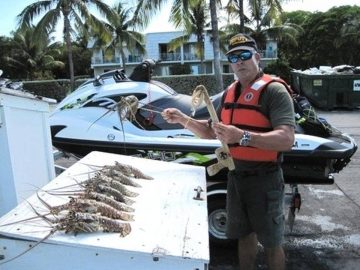 Willy Guerra keeps a dry uniform ready at home because his clothes are often wet from jumping into Florida Keys waters to catch criminals. Guerra, the chief Monroe County Sheriff’s Office marine deputy who is based in Marathon, is no stranger to hiding out and waiting to catch those who would deplete the Keys’ natural resources — fish and lobster in particular. Since he became a marine deputy in 2005, Guerra’s hidden in a garbage can, on top of a sewer treatment plant and in mangroves, staking out criminal activity at all hours of the day and night. Tuesday, the Marathon City Council commended Guerra with a plaque for his efforts. One particular case from 2015 involving a man from Miami who was prosecuted for stealing lobster in Marathon was highlighted. Bill Kelly, executive director the Florida Keys Commercial Fishermen’s Association, said George Vargas worked for at least three years in Marathon poaching lobster. In one night, Guerra caught Vargas with 267 wrung lobster tails of all sizes. They weighed out at 225 pounds with a commercial value of $4,205. “He made $723,000 in a year if he worked all year and we know he did that for at least three years, so we’re talking $2.16 million he absconded with from the men and women in the commercial fishing industry,” Kelly said. Read the story here 09:51
Willy Guerra keeps a dry uniform ready at home because his clothes are often wet from jumping into Florida Keys waters to catch criminals. Guerra, the chief Monroe County Sheriff’s Office marine deputy who is based in Marathon, is no stranger to hiding out and waiting to catch those who would deplete the Keys’ natural resources — fish and lobster in particular. Since he became a marine deputy in 2005, Guerra’s hidden in a garbage can, on top of a sewer treatment plant and in mangroves, staking out criminal activity at all hours of the day and night. Tuesday, the Marathon City Council commended Guerra with a plaque for his efforts. One particular case from 2015 involving a man from Miami who was prosecuted for stealing lobster in Marathon was highlighted. Bill Kelly, executive director the Florida Keys Commercial Fishermen’s Association, said George Vargas worked for at least three years in Marathon poaching lobster. In one night, Guerra caught Vargas with 267 wrung lobster tails of all sizes. They weighed out at 225 pounds with a commercial value of $4,205. “He made $723,000 in a year if he worked all year and we know he did that for at least three years, so we’re talking $2.16 million he absconded with from the men and women in the commercial fishing industry,” Kelly said. Read the story here 09:51
Capt. Keith Williams: New head of DEEP’s EnCon Marine Division
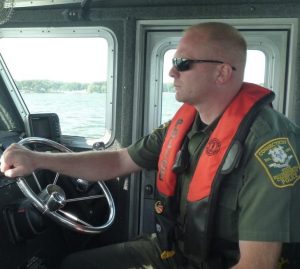 As the newly appointed head of the Marine Division of the state Department of Energy and Environmental Protection’s EnCon Police, Williams, 44, is in charge of keeping up with a wide array of regulations that change with the seasons across a large area of the state. “I’m a huge field guy,” said Williams. “I like to be involved in what the guys are doing.” Along with making sure recreational fishermen and boaters are following the laws for fishing seasons, no-wake zones and licensing, the Marine Division also conducts periodic checks of wholesale and retail seafood dealers to make sure the fish being sold meet state regulations,, and do periodic checks of the state’s commercial fishermen, based mainly in Stonington and New London. “I’ll check when they’re offloading, doing surprise checks at the dock,” he said. “We’ll go to the docks in Stonington frequently just to keep them honest, and let them know we’re out there.” Read the story here 19:33
As the newly appointed head of the Marine Division of the state Department of Energy and Environmental Protection’s EnCon Police, Williams, 44, is in charge of keeping up with a wide array of regulations that change with the seasons across a large area of the state. “I’m a huge field guy,” said Williams. “I like to be involved in what the guys are doing.” Along with making sure recreational fishermen and boaters are following the laws for fishing seasons, no-wake zones and licensing, the Marine Division also conducts periodic checks of wholesale and retail seafood dealers to make sure the fish being sold meet state regulations,, and do periodic checks of the state’s commercial fishermen, based mainly in Stonington and New London. “I’ll check when they’re offloading, doing surprise checks at the dock,” he said. “We’ll go to the docks in Stonington frequently just to keep them honest, and let them know we’re out there.” Read the story here 19:33
OLD LYME, Conn. DEEP dogs now trained to track something fishy
 With fishing season starting Saturday, EnCon police now have a new tool to catch folks who try to break the rules. Ruger is one of four search and rescue dogs on DEEP’s Environmental Conservation Police force. He and two others have undergone special training to sniff out fish, which may be hidden by those trying catch more than they’re allowed. Read the rest here 10:06
With fishing season starting Saturday, EnCon police now have a new tool to catch folks who try to break the rules. Ruger is one of four search and rescue dogs on DEEP’s Environmental Conservation Police force. He and two others have undergone special training to sniff out fish, which may be hidden by those trying catch more than they’re allowed. Read the rest here 10:06
North Carolina DMF treading water on JEA, waiting for approval from top government officials
 The state budget, echoing a directive from the N.C. Marine Fisheries Commission, gave Dr. Louis Daniel, NCDMF’s executive director, the authority to enter into an Joint Enforcement Agreement with the that would provide the state with an estimated $600,000 per year to allow the marine patrol and NMFS enforcement officers to respond to fisheries violations in either state or federal waters off North Carolina. Read the rest here 14:54
The state budget, echoing a directive from the N.C. Marine Fisheries Commission, gave Dr. Louis Daniel, NCDMF’s executive director, the authority to enter into an Joint Enforcement Agreement with the that would provide the state with an estimated $600,000 per year to allow the marine patrol and NMFS enforcement officers to respond to fisheries violations in either state or federal waters off North Carolina. Read the rest here 14:54
Fisheries enforcement in the Gulf under the JEA – On offshore patrol
 Thanks to a Joint Enforcement Agreement between LDWF and U. S. National Marine Fisheries (Service), wildlife agents also patrol federal waters extending from Louisiana’s boundary waters to 200 miles seaward into the Gulf. The federal waters are also known as the Exclusive Economic Zone. Read more here 09:50
Thanks to a Joint Enforcement Agreement between LDWF and U. S. National Marine Fisheries (Service), wildlife agents also patrol federal waters extending from Louisiana’s boundary waters to 200 miles seaward into the Gulf. The federal waters are also known as the Exclusive Economic Zone. Read more here 09:50
Hijinks on the high seas – Crab boats allegedly work extra pots
 PACIFIC OCEAN — Looking out over the rolling swells of the Columbia Bar on the morning of Sunday, Dec. 9, Washington Department of Fish and Wildlife officer Dan Chadwick strained to find an orange and blue buoy that bobbed at the bottom of a trough of water. “It’s like finding a needle in a haystack,” Chadwick sighed. That buoy was just one of more than 400 such “needles” that Chadwick and his fellow Washington Department of Fish and Wildlife officers needed to find and count before the tide went out around mid-day. Read more@chinookobserver 14:38
PACIFIC OCEAN — Looking out over the rolling swells of the Columbia Bar on the morning of Sunday, Dec. 9, Washington Department of Fish and Wildlife officer Dan Chadwick strained to find an orange and blue buoy that bobbed at the bottom of a trough of water. “It’s like finding a needle in a haystack,” Chadwick sighed. That buoy was just one of more than 400 such “needles” that Chadwick and his fellow Washington Department of Fish and Wildlife officers needed to find and count before the tide went out around mid-day. Read more@chinookobserver 14:38






